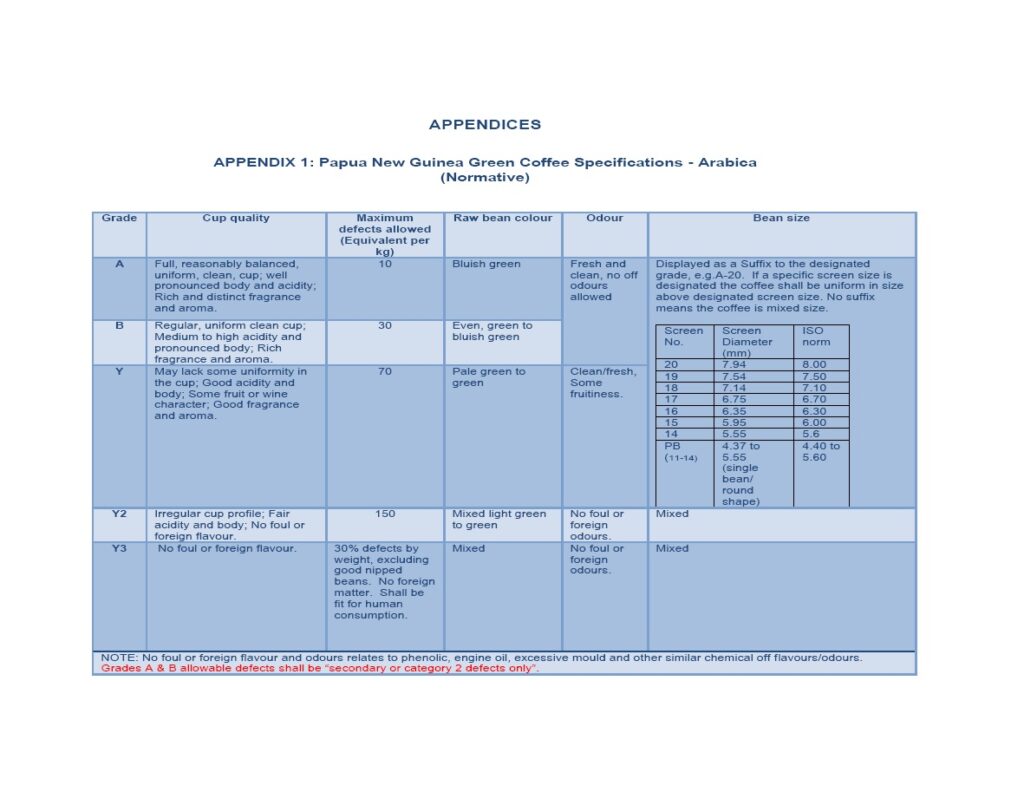PORT MORESBY, Papua New Guinea – Papua New Guinea’s national coffee regulatory authority has completed a rollout of the industry’s revised green bean standards and new regulation policy guidelines. Published by Coffee Industry Corporation (CIC) and approved by the National Institute of Standards and Industrial Technology (NISIT) in late 2020, the new standards seek to address price discrimination against small holders in the coffee industry.
Under the prior system, coffees not produced on large plantations were unable to receive the country’s top grade, regardless of quality achievement. The update eliminates the restriction and simplifies the number of Arabica grade categories from thirteen to five (A, B, Y, Y2, and Y3). A numerical suffix may be added to the top three grades to designate screen size (e.g., A-18).
“For Arabica, the new A grade effectively replaces AA, A, AB, C, PB, C, X, and E, all of which had similar cupping qualities,” explained long-time PNG coffee industry representative Mick Wheeler. “The new B grade replaces the existing PSC grade, with Y becoming Y1, Y2 remaining essentially the same, and Y3, less restrictive. In Robusta, R1 is a completely new superior grade, which will apply to any better-quality Robusta coffee produced in future that will be destined for the specialty market.”
Through the support of the Australia and New Zealand Governments, CIC and the Pacific Horticultural and Agricultural Market Access (PHAMA Plus) Program conducted a four-day workshop recently in Port Moresby for the Southern region to ensure all coffee stakeholders are informed on the revised green coffee standard and regulatory policy guidelines. The workshop also allowed the parties to discuss changes in the documentation process, the Online Export Manager System and gaps within the industry that need specific training. CIC has already conducted similar workshops in coffee producing areas of the Highlands, Momase, and Island regions.
“Green coffee quality standards are strictly enforced CIC’s Export and Quality Control office at the export port at Lae,” said Senior Quality Control Officer Rose Romalus. “PNG is able to maintain market competitiveness through regulations and processes that protect the country’s image abroad.”
More information on the new guidelines can be obtained by contacting CIC through their Facebook page.
Papua New Guinea Green Coffee Specifications – Arabica (click to enlarge)
 About PHAMA Plus
About PHAMA Plus
PHAMA Plus is funded by the Governments of Australia and New Zealand and aims to contribute to improved economic growth and improved rural livelihoods for Pacific peoples. PHAMA Plus provides practical and targeted assistance to help Pacific Island Countries manage regulatory aspects associated with exporting primary and processed horticulture and agriculture products.
This encompasses the provision of support to PHAMA Plus beneficiaries to gain access for products into new markets and to help manage issues associated with maintaining and improving existing trade. Core countries assisted through PHAMA Plus are Fiji, PNG, Samoa, Solomons Islands, Tonga, and Vanuatu and program support is now being extended to Small Island States (SIS’s) that have ratified PACER Plus, currently Cook Islands, Kiribati, and Niue.


















